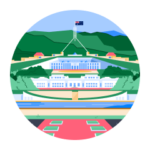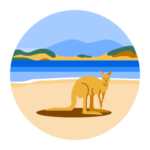Careers that help sustain our planet or take climate action are of increasing interest to international students. Below, we’ve shared five undergraduate sustainability courses that teach the skills you’ll need to address these challenges. Whether you prefer a specific focus or a multidisciplinary approach, Australian universities offer a range of courses that will help you become a leader in this field.
By working together, we can all make a difference!
If you’re interested in working while studying abroad, learn more about the important updates to Australian student work visa rules.

Bachelor of Business and Environmental Science
James Cook University
Explore the important and challenging work of balancing profit, policy, and conservation with the Bachelor of Business and Environmental Science course. This three-year bachelor’s degree with an optional professional placement helps students build their environmental science knowledge. Plus, it provides the skills needed to make sustainable and competitive business practices.
James Cook University is Australia’s leading tropical research university, and is home to The Centre for Tropical Environmental and Sustainability Science (TESS). At TESS, over 100 global researchers collaborate on high-impact research. James Cook University also ranks #32 on the US News & World Report’s Best Universities for Environment and Ecology list.
Campuses are near a wide range of ecosystems, and the program encourages fieldwork. This makes this course a great fit for students who want to focus on sustainability in tropical places!
What does an average international student budget in Australia look like? Find out on our blog.

Bachelor of Environment and Sustainability
Australia National University
The Bachelor of Environment & Sustainability course at Australia National University (ANU) allows students to graduate with an action-forward degree after three years. Graduates work on finding sustainable solutions to issues including biodiversity loss, urbanization, and climate change.
Classes cover environmental science along with policy and social sciences. This mix gives students diverse tools to approach the complex challenges of sustainability. Graduates pursue careers in climate change consulting, water management, urban planning, and policy.
To learn more about ANU, read our Partner School Spotlight! You’ll pick up top tips on everything from campus life to scholarship options.

Bachelor of Arts: Community, Culture, and Environment
University of Wollongong
This three-year undergraduate degree from the University of Wollongong leans on knowledge from multiple faculties. Per the course description:
Subjects offered by Sociology and Politics inform the theme of community, those offered by English, History and Media and Cultural Studies inform the cultural theme, and those offered by Earth Sciences or Science and Technology Studies inform the course’s environmental theme. However, many of the subjects offered [combine multiple] themes, especially the subjects offered by the Woolyungah Indigenous Centre.
Students may extend their degree with an optional one-year Honours course. The Honours year is a good match for students who wish to undertake research or pursue further research-based degrees.
Note: Honours course entry is determined by a recommendation from the Honours Coordinator, following the student’s application to the Honours year. To learn what you’ll need to qualify, review the course page on the ApplyBoard Platform.

Bachelor of Natural Environment and Wilderness Studies
University of Tasmania
This three year course at the University of Tasmania gives students a multi-disciplinary approach to tackling environmental issues. Graduates also develop skills to conserve biodiversity and geodiversity, and can act towards building a better world.
As the course description notes: “An ability to think critically and creatively across disciplines, in the intersection between nature and human society, is vital for informing the management, protection, and use of our natural environment.”
Tasmania is sometimes called a living laboratory. This is because 20% of the state is within World Heritage Areas, and 42% is protected. Coupled with access to world-leading research at the University of Tasmania, students can also engage with the natural environment through fieldwork. The university itself has been carbon-neutral since 2016, and divested from investing in carbon-intensive investments in 2021. Plus, it was ranked #1 globally for climate action by the Higher Education Impact Rankings in April 2022.
Here are some ways to live more sustainably while studying abroad!

Bachelor of Environmental Science and Bachelor of Environment and Society
Royal Melbourne Institute of Technology–Melbourne
In this double degree, students address how to respond and adapt to environmental change. This four-year course combines science and social science knowledge. It’s designed to give students the skills required to succeed in environmental governance positions, or become a leader in the sustainability field.
Through classwork, labs, and fieldwork, students build their knowledge of scientific and social theory. During hands-on projects, classes apply theoretical concepts to practical problems. Students also gain industry skills with business engagements and work placements.
Planning to study Down Under? Check out our guide to Australia’s Genuine Temporary Entrant (GTE) assessment.
Want to study sustainability courses in Australia? Check out the ApplyBoard Platform. We’re proud to partner with post-secondary institutions from across Australia, and showcase their courses to over 100,000 future international students every month.
Find the international study course that matches your academic goals today!



